
In mathematics, the Fibonacci numbers, commonly denoted Fn, form a sequence, called the Fibonacci sequence, such that each number is the sum of the two preceding ones, starting from 0 and 1. That is,
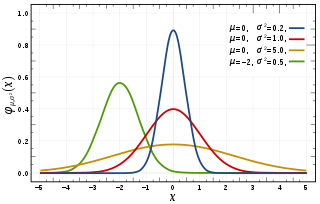
In probability theory, a normaldistribution is a type of continuous probability distribution for a real-valued random variable. The general form of its probability density function is

Oxygen is the chemical element with the symbol O and atomic number 8. It is a member of the chalcogen group in the periodic table, a highly reactive nonmetal, and an oxidizing agent that readily forms oxides with most elements as well as with other compounds. After hydrogen and helium, oxygen is the third-most abundant element in the universe by mass. At standard temperature and pressure, two atoms of the element bind to form dioxygen, a colorless and odorless diatomic gas with the formula O
2. Diatomic oxygen gas currently constitutes 20.95% of the Earth's atmosphere, though this has changed considerably over long periods of time. Oxygen makes up almost half of the Earth's crust in the form of oxides.
The number π is a mathematical constant. It is defined as the ratio of a circle's circumference to its diameter, and it also has various equivalent definitions. It appears in many formulas in all areas of mathematics and physics. The earliest known use of the Greek letter π to represent the ratio of a circle's circumference to its diameter was by Welsh mathematician William Jones in 1706. It is approximately equal to 3.14159. It has been represented by the Greek letter "π" since the mid-18th century, and is spelled out as "pi". It is also referred to as Archimedes' constant.
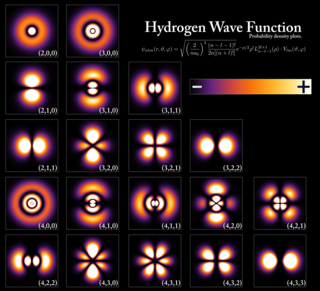
Quantum mechanics is a fundamental theory in physics that provides a description of the physical properties of nature at the scale of atoms and subatomic particles. It is the foundation of all quantum physics including quantum chemistry, quantum field theory, quantum technology, and quantum information science.
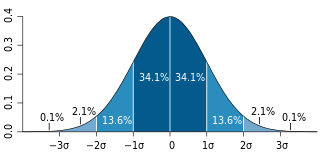
In statistics, the standard deviation is a measure of the amount of variation or dispersion of a set of values. A low standard deviation indicates that the values tend to be close to the mean of the set, while a high standard deviation indicates that the values are spread out over a wider range.

U2 are an Irish rock band from Dublin, formed in 1976. The group consists of Bono, the Edge, Adam Clayton, and Larry Mullen Jr.. Initially rooted in post-punk, U2's musical style has evolved throughout their career, yet has maintained an anthemic quality built on Bono's expressive vocals and the Edge's chiming, effects-based guitar sounds. Their lyrics, often embellished with spiritual imagery, focus on personal and sociopolitical themes. Popular for their live performances, the group have staged several ambitious and elaborate tours over their career.

The Sweden national football team represents Sweden in men's international football and it is controlled by the Swedish Football Association, the governing body of football in Sweden. Sweden's home ground is Friends Arena in Solna and the team is coached by Janne Andersson. From 1945 to late 1950s, they were considered one of the greatest teams in Europe.

The North Macedonia national football team represents North Macedonia in men's international football, and is administered by the Football Federation of Macedonia. The team play their home matches at the Toše Proeski Arena in Skopje.

The Switzerland national football team represents Switzerland in international football. The national team is controlled by the Swiss Football Association.

The Czech Republic national football team represents the Czech Republic in international football. The team is controlled by the Football Association of the Czech Republic (FAČR). Historically, the team participated in FIFA and UEFA competitions as Bohemia and Czechoslovakia.
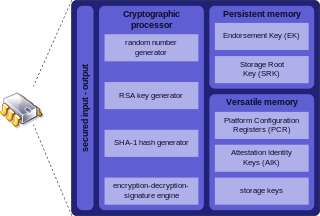
Trusted Platform Module is an international standard for a secure cryptoprocessor, a dedicated microcontroller designed to secure hardware through integrated cryptographic keys.
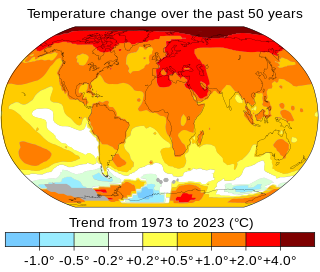
Climate change includes both global warming driven by human-induced emissions of greenhouse gases and the resulting large-scale shifts in weather patterns. Though there have been previous periods of climatic change, since the mid-20th century humans have had an unprecedented impact on Earth's climate system and caused change on a global scale.

Joachim Löw is a German football coach and former player. He was the manager of the Germany national team from 2006 until 2021, which he led to victory at the 2014 FIFA World Cup in Brazil and the 2017 FIFA Confederations Cup in Russia. On 9 March 2021, Löw announced that he would resign from his position after Euro 2020.

The PlayStation 2 (PS2) is a home video game console developed and marketed by Sony Computer Entertainment. It was first released in Japan on March 4, 2000, in North America on October 26, 2000, in Europe on November 24, 2000, and in Australia on November 30, 2000. It is the successor to the original PlayStation, as well as the second installment in the PlayStation console line-up. A sixth-generation console, it competed with Sega's Dreamcast, Nintendo's GameCube, and Microsoft's original Xbox.

Diabetes mellitus (DM), commonly known as just diabetes, is a group of metabolic disorders characterized by a high blood sugar level over a prolonged period of time. Symptoms often include frequent urination, increased thirst and increased appetite. If left untreated, diabetes can cause many health complications. Acute complications can include diabetic ketoacidosis, hyperosmolar hyperglycemic state, or death. Serious long-term complications include cardiovascular disease, stroke, chronic kidney disease, foot ulcers, damage to the nerves, damage to the eyes and cognitive impairment.

Severe acute respiratory syndrome coronavirus 2 (SARS‑CoV‑2) is the virus that causes COVID-19, the respiratory illness responsible for the COVID-19 pandemic. Also colloquially known simply as the coronavirus, it was previously referred to by its provisional name, 2019 novel coronavirus (2019-nCoV), and has also been called human coronavirus 2019. The World Health Organization declared the outbreak a Public Health Emergency of International Concern on 30 January 2020, and a pandemic on 11 March 2020. SARS‑CoV‑2 is a positive-sense single-stranded RNA virus that is contagious in humans. As described by the US National Institutes of Health, it is the successor to SARS-CoV-1, the virus that caused the 2002–2004 SARS outbreak.

Severe acute respiratory syndrome coronavirus 2 (SARS-CoV-2), the virus that causes coronavirus disease 2019 (COVID-19), has many variants; some are believed, or have been believed, to be of particular importance due to their potential for increased transmissibility, increased virulence, or reduced effectiveness of vaccines against them. This article discusses such notable variants of SARS-CoV-2 and notable missense mutations found in these variants.

SARS-CoV-2Delta variant, also known as lineage B.1.617.2, is a variant of lineage B.1.617 of SARS-CoV-2, the virus that causes COVID-19. It was first detected in India in late 2020. The World Health Organization (WHO) named it the Delta variant on 31 May 2021.

















